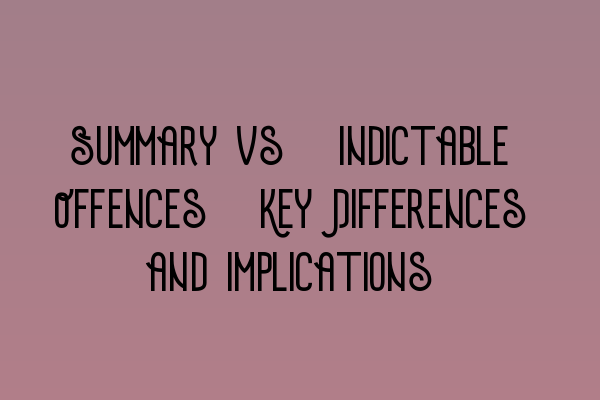Summary vs. Indictable Offences: Key Differences and Implications
When it comes to criminal law in the UK, offences are divided into two main categories: summary offences and indictable offences. Understanding the differences between the two is crucial for anyone involved in the legal system, whether as a solicitor, barrister, or defendant. In this article, we will explore the key differences and implications of summary and indictable offences.
Summary Offences
Summary offences, also known as minor offences, are less serious criminal offences that are typically dealt with in a Magistrates’ Court. These offences are usually heard by a single magistrate or a panel of magistrates, and do not involve a jury.
Common examples of summary offences include petty theft, public disorder offences, minor assault, and traffic violations. These offences are considered to be less serious in nature and carry a maximum punishment of a fine, community service, or a short prison sentence of up to six months.
One key characteristic of summary offences is that there is no automatic right to a trial by jury. However, in some cases, a defendant can choose to have their case heard before a jury in the Crown Court if they believe it is in their best interest.
If you are facing a summary offence, it is essential to seek legal representation from a qualified solicitor who specializes in criminal law. They can provide expert advice and help navigate the legal process, ensuring your rights are protected.
Indictable Offences
Unlike summary offences, indictable offences are more serious criminal offences that must be heard before a judge and jury in the Crown Court. These offences include crimes such as murder, rape, robbery, and other violent crimes.
The seriousness of indictable offences is reflected in the potential punishments they carry. Unlike summary offences, indictable offences have no maximum sentence, and the punishment can vary depending on the circumstances of the case. For example, murder is punishable by life imprisonment, while lesser offences may carry shorter prison sentences or community orders.
Indictable offences are typically prosecuted by the Crown Prosecution Service (CPS) on behalf of the state. The CPS presents the case against the defendant, and it is the role of the defence solicitor to represent and defend the interests of their client.
When facing an indictable offence, it is crucial to have a skilled solicitor who specializes in criminal defence. They will guide you through the complex legal process, gather evidence, and present a strong defence on your behalf.
Implications and Considerations
The classification of an offence as summary or indictable has significant implications for both the defendant and the legal process. Here are some key considerations:
- Legal Representation: Regardless of the offence, it is always advisable to seek legal representation. Having a solicitor who specializes in criminal law will ensure that your rights are protected and that you receive a fair trial.
- Jurisdiction: The type of offence determines which court has jurisdiction over the case. Summary offences are heard in the Magistrates’ Court, while indictable offences are heard in the Crown Court. Understanding this distinction is crucial for proper legal representation.
- Punishment: Summary offences usually carry lesser punishments, such as fines or short prison sentences. Indictable offences, on the other hand, can result in more severe penalties, including life imprisonment.
- Legal Process: The legal process differs between summary and indictable offences. Summary offences are typically resolved more quickly, while indictable offences involve a more complex and lengthy process.
- Right to Jury Trial: Defendants charged with indictable offences have an automatic right to a trial by jury. This allows for a fair and impartial assessment of the evidence presented.
Understanding the differences between summary and indictable offences is essential for anyone involved in the legal system. Whether you are a solicitor, barrister, or defendant, being well-informed will help you navigate the criminal justice system more effectively.
If you require legal representation for a criminal offence or are studying for the SQE exam, consider contacting SQE Criminal Law & Practice Law UK. Their team of expert solicitors can provide you with the necessary advice and support to achieve the best possible outcome in your case.
Related Articles:
- Legal Representation for Delaware LLCs in the UK: Expert Advice
- Ensuring Ethical Business Practices: Delaware’s Code of Conduct
- Legal Challenges for UK Businesses in the U.S.: Strategies for Overcoming Hurdles
- Legal Challenges for UK Businesses in the U.S.: Strategies for Overcoming Hurdles
- SQE Exam Prep: Essential Study Materials for Aspiring Solicitors
